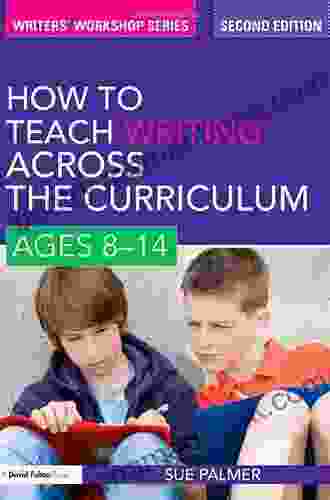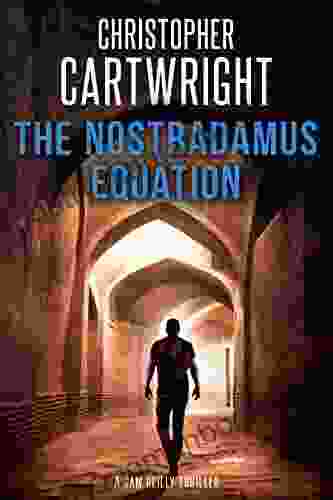How to Teach Writing Across the Curriculum: A Comprehensive Guide for Educators

Writing is a fundamental skill that students need to succeed in school and beyond. However, many students struggle with writing, and teachers often feel overwhelmed when it comes to teaching it. This guide will provide educators with a step-by-step approach to teaching writing across the curriculum.
4.8 out of 5
| Language | : | English |
| File size | : | 3983 KB |
| Text-to-Speech | : | Enabled |
| Screen Reader | : | Supported |
| Enhanced typesetting | : | Enabled |
| Word Wise | : | Enabled |
| Print length | : | 110 pages |
Step 1: Define Your Goals
The first step in teaching writing across the curriculum is to define your goals. What do you want your students to be able to do by the end of the year? Once you know your goals, you can start to develop a plan for achieving them.
Some common goals for writing instruction include:
- To improve students' ability to write clear and concise sentences.
- To help students develop their writing fluency.
- To teach students how to write different types of essays, including persuasive essays, expository essays, and narrative essays.
- To prepare students for the writing portion of standardized tests.
Step 2: Choose Your Methods
Once you know your goals, you can start to choose your methods. There are many different methods for teaching writing, so it is important to find one that works for you and your students.
Some common writing methods include:
- The writing process
- Peer review
- Revision and editing
- Technology
The Writing Process
The writing process is a step-by-step approach to writing that helps students to develop their ideas and write clear and concise essays.
The writing process includes the following steps:
- Prewriting
- Drafting
- Revising
- Editing
- Publishing
Peer Review
Peer review is a great way for students to get feedback on their writing and to learn from each other.
When students peer review, they read each other's work and provide feedback on the following:
- Content
- Organization
- Style
- Grammar
- Mechanics
Revision and Editing
Revision and editing are essential steps in the writing process.
When students revise, they make changes to the content, organization, and style of their essays.
When students edit, they correct errors in grammar, usage, and mechanics.
Technology
Technology can be a valuable tool for teaching writing.
There are many different types of educational software that can help students to learn about writing, including word processors, grammar checkers, and online writing resources.
Step 3: Implement Your Plan
Once you have chosen your methods, you can start to implement your plan.
Here are some tips for implementing your plan:
- Start small. Don't try to do too much too soon.
- Be consistent. Set aside time each day for writing instruction.
- Be patient. It takes time for students to develop their writing skills.
- Be flexible. Be willing to adjust your plan as needed.
Step 4: Assess Your Students
It is important to assess your students' writing progress on a regular basis.
There are many different ways to assess writing, including:
- Portfolios
- Rubrics
- Interviews
- Observations
Teaching writing across the curriculum is a challenging but rewarding task.
By following the steps outlined in this guide, you can help your students to become confident and effective writers.
Additional Resources
- 5 Steps for Teaching Writing Across the Curriculum
- Teaching Writing Across the Curriculum
4.8 out of 5
| Language | : | English |
| File size | : | 3983 KB |
| Text-to-Speech | : | Enabled |
| Screen Reader | : | Supported |
| Enhanced typesetting | : | Enabled |
| Word Wise | : | Enabled |
| Print length | : | 110 pages |
Do you want to contribute by writing guest posts on this blog?
Please contact us and send us a resume of previous articles that you have written.
 Top Book
Top Book Novel
Novel Fiction
Fiction Nonfiction
Nonfiction Literature
Literature Paperback
Paperback Hardcover
Hardcover E-book
E-book Audiobook
Audiobook Bestseller
Bestseller Classic
Classic Mystery
Mystery Thriller
Thriller Romance
Romance Fantasy
Fantasy Science Fiction
Science Fiction Biography
Biography Memoir
Memoir Autobiography
Autobiography Poetry
Poetry Drama
Drama Historical Fiction
Historical Fiction Self-help
Self-help Young Adult
Young Adult Childrens Books
Childrens Books Graphic Novel
Graphic Novel Anthology
Anthology Series
Series Encyclopedia
Encyclopedia Reference
Reference Guidebook
Guidebook Textbook
Textbook Workbook
Workbook Journal
Journal Diary
Diary Manuscript
Manuscript Folio
Folio Pulp Fiction
Pulp Fiction Short Stories
Short Stories Fairy Tales
Fairy Tales Fables
Fables Mythology
Mythology Philosophy
Philosophy Religion
Religion Spirituality
Spirituality Essays
Essays Critique
Critique Commentary
Commentary Glossary
Glossary Bibliography
Bibliography Index
Index Table of Contents
Table of Contents Preface
Preface Introduction
Introduction Foreword
Foreword Afterword
Afterword Appendices
Appendices Annotations
Annotations Footnotes
Footnotes Epilogue
Epilogue Prologue
Prologue Azar Nafisi
Azar Nafisi Gayle Jessup White
Gayle Jessup White Andrea Carter
Andrea Carter Kindle Edition
Kindle Edition Tracy Wolff
Tracy Wolff Diamond Layne
Diamond Layne Sarah L Carter
Sarah L Carter Tom Conklin
Tom Conklin Robert Fisher
Robert Fisher Jason Guriel
Jason Guriel Vivian Stuart
Vivian Stuart Sue Palmer
Sue Palmer Rosemary Tonks
Rosemary Tonks Emma Goldrick
Emma Goldrick Ken Hyland
Ken Hyland Pascal Weber
Pascal Weber Don Yarber
Don Yarber Bronwyn Leroux
Bronwyn Leroux Project Learning Tree
Project Learning Tree Ina Ramesh
Ina Ramesh
Light bulbAdvertise smarter! Our strategic ad space ensures maximum exposure. Reserve your spot today!
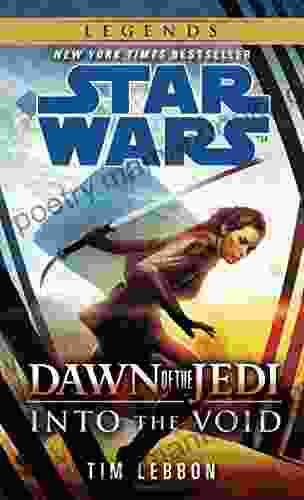
 Jean BlairStar Wars Legends: Dawn of the Jedi - The Dawn of a New Era in the Star Wars...
Jean BlairStar Wars Legends: Dawn of the Jedi - The Dawn of a New Era in the Star Wars...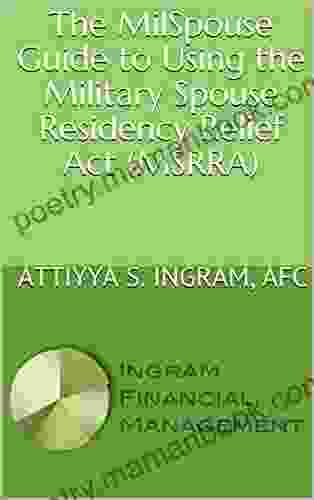
 Herman MitchellThe Milspouse Guide to Using the Military Spouse Residency Relief Act (MSRRA)
Herman MitchellThe Milspouse Guide to Using the Military Spouse Residency Relief Act (MSRRA)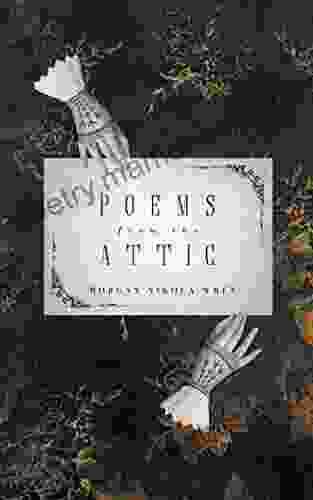
 Dustin RichardsonPoems From the Attic: Uncovering the Hidden Treasures of Morgan Nikola Wren
Dustin RichardsonPoems From the Attic: Uncovering the Hidden Treasures of Morgan Nikola Wren Stephen FosterFollow ·5.9k
Stephen FosterFollow ·5.9k Greg FosterFollow ·9.3k
Greg FosterFollow ·9.3k Joseph FosterFollow ·3.6k
Joseph FosterFollow ·3.6k Ed CooperFollow ·6.2k
Ed CooperFollow ·6.2k Edward BellFollow ·4.8k
Edward BellFollow ·4.8k Edgar Allan PoeFollow ·16.6k
Edgar Allan PoeFollow ·16.6k Bobby HowardFollow ·18.2k
Bobby HowardFollow ·18.2k Arthur C. ClarkeFollow ·17k
Arthur C. ClarkeFollow ·17k
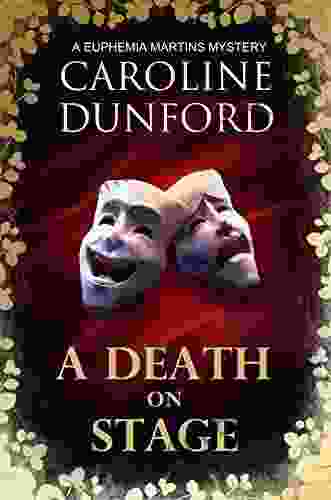
 Patrick Hayes
Patrick HayesDeath on Stage: Euphemia Martins Mystery 16
Synopsis In the...

 Benji Powell
Benji Powell1001 Best Baking Recipes Of All Time
Baking is a fun and...
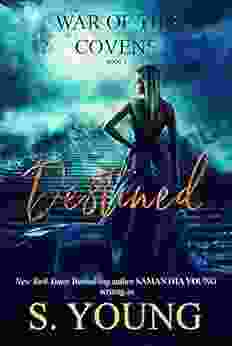
 Terry Bell
Terry BellDestined War of the Covens: A Supernatural Saga of Power,...
Welcome to the...

 Mark Twain
Mark TwainBitcoin For Mere Mortals: A Comprehensive Guide for...
Bitcoin is a...

 Dennis Hayes
Dennis HayesThe Best Budget Gaming PC 2024: Build the Ultimate Gaming...
Are you looking to build the best budget...
4.8 out of 5
| Language | : | English |
| File size | : | 3983 KB |
| Text-to-Speech | : | Enabled |
| Screen Reader | : | Supported |
| Enhanced typesetting | : | Enabled |
| Word Wise | : | Enabled |
| Print length | : | 110 pages |


